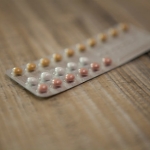An updated article on this topic can be found HERE.
An estimated 80% of sexually active young women in the United States use hormonal or oral contraceptives (OCs). Clinically it is found that some women report depression or mood swings with oral contraceptives; however, many women seem to tolerate hormonal contraceptive without any effects on mood. Despite the prevalence of OC usage, few studies have explored the association between hormonal contraceptive use and mood disturbance.
In a recent study, 6,654 sexually active non-pregnant women were recruited from the National Longitudinal Study of Adolescent Health. In a cohort of women aged 25–34 years, the researchers compared contraceptive users with other sexually active women who were using either non-hormonal contraception or no contraception. Depressive symptoms were assessed with the Center for Epidemiologic Studies Depression Scale.
What they found was that users of hormonal contraceptives had lower mean levels of depressive symptoms and were less likely to have attempted suicide in the previous year (odds ratio = 0.37, 95% confidence interval: 0.14, 0.95) than women using other forms of contraception or no contraception.
While this study may provide some reassurance to women concerned about the impact of oral contraceptives on their mood, many questions still remain. This was a cross-sectional study, where women were evaluated at a single time point. One might hypothesize that women who developed mood symptoms after treatment with an oral contraceptive most likely stopped taking OCs, so that in this study the hormonal contraceptive users as a group consisted primarily of women who tolerated OCs whereas the non-user group contained a higher number of women who were unable to tolerate OCs.
Of particular concern is the impact of hormonal contraceptives on mood in women with histories of depression. In the Harvard Study of Moods and Cycles, it was found that women with histories of depression were more likely to experience premenstrual mood worsening on OCs than women with no history of depression. However, most women with a history of depression experienced either no change in their mood (61%) or mood improvement (14%); 25% of the women, however, experienced premenstrual mood worsening on the pill.
Before starting a birth control pill, women should talk to their doctors about their history of depression. Those with a history of depression should be attentive to potential mood changes after starting an oral contraceptive; however, these studies taken together indicate that oral contraceptives may be a viable option for contraception for all women, including those with a history of depression.
Ruta Nonacs, MD PHD
Keys KM, Cheslack-Postava K, Westhoff C, et al. Association of Hormonal Contraceptive Use With Reduced Levels of Depressive Symptoms: A National Study of Sexually Active Women in the United States. Am J Eidemiol 2013.






That’s a very good point you bring up.